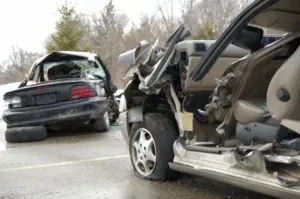Fatal Car Accident Attorney
Looking for an accident attorney who will fight to get you the most money possible after a fatal car accident?
Most of us know the pain of losing a close family member or friend. Still, many of us cannot imagine the utter shock and heartbreak that a family feels when they learn that a loved one has died in a fatal automobile accident. The unimaginable trauma can leave a family at a total loss, and learning that the other driver is at fault can make it even more difficult to cope. If someone is to blame for the loss of your loved one in a fatal car crash, then you should consult with an experienced attorney who can explain your options with patience and compassion. This article will provide you with a basic understanding of what you can expect should you decide to bring a claim against the other driver.
Call My Rights Law – Experienced Fatal Car Accident Lawyers Today
When you hire a skilled injury lawyer from My Rights Law, you could get up to ten times more then the original insurance offer. The top-notch car accident lawyers at My Rights Law are devoted to helping clients (families of the victims) get justice and compensation in car accident claims. With your consultation, we will evaluate the circumstances which resulted in your loved one’s death, including a review of the police report and any statements from witnesses, and advise you on your options. Most wrongful death cases stemming from fatal car accidents are handled on a contingency fee basis, so attorney’s fees are not due unless you obtain a recovery in your claim or lawsuit. We strive to get you and your family maximum financial compensation in your fatal auto accident case. Do not make the mistake of hiring just any law firm to resolve this type of matter. Call one of the best car accident lawyers. To speak with My Rights Law’s skilled auto accident attorneys regarding a fatal accident that claimed the life of your loved one, call (888) 702-8845 or leave a message on our secure web form.
- 1. Fatal Car Crash Statistics
- 2. What Are The Common Causes Of Fatal Car Crashes?
- 3. What Is A Fatal Car Crash Wrongful Death Claim?
- 4. Who Can File A Wrongful Death Claim?
- 5. What Damages Can A Family Recover After A Fatal Crash?
- 6. What Is Comparative Negligence?
- 7. What Are The Time Limits For Filing A Lawsuit?
Fatal Car Crash Statistics
Fortunately, traffic-related fatalities have been dropping over the past few years. The National Highway Traffic Safety Administration reported a drop of 2% between 2018 and 2019. Nationwide, passenger vehicle occupant fatalities dropped by 2.8%, pedestrian fatalities dropped by 2.7%, cyclist fatalities dropped by 2.9%, and drunk driving deaths dropped by 5.3%. Despite the encouraging changes, traffic fatalities remain one of the most likely causes of accidental death in the United States.
What Are The Common Causes Of Fatal Car Crashes?
There are many causes of car accidents, and nearly all of them can lead to fatalities in the right set of circumstances. Even a typically responsible motorist can make a fatal mistake if they fail to pay attention to the road for even a few seconds.
Some of the top causes of severe car crashes include the following:
- Drunk driving
- Speeding
- Distracted driving
- Using a cell phone while driving
- Ignoring traffic signals such as red lights
- Driving while tired or fatigued
Thousands of people are killed in car accidents involving drunk drivers every year. These accidents are often among the most severe crashes on the road. Though its risk is often overlooked, speeding is also a big contributor to deadly accidents – motorists are constantly driving recklessly. People often forget just how dangerous it is to violate a speed limit. When you travel too fast for the road conditions or above a posted speed limit, you reduce the amount of time that you have to react should a hazard suddenly arise. Also, speeding may minimize the effectiveness of the safety features in your vehicle.
Most drivers understand but don’t fully appreciate the perils of distracted driving, especially using a cell phone or texting while driving. Despite their awareness of its dangers, many drivers still feel the need to send a text while operating their vehicle. Research shows that, on average, a person removes their eyes from the road for five seconds at a time to read or write a text message. In that short amount of time, you can travel the length of a football field and miss the signs of an upcoming hazard.
Any drivers who engage in the above dangerous behaviors are at risk of causing severe crashes. Although weather and vehicle malfunctions can also lead to traffic accidents, statistics indicate that driver error is the leading cause of collisions. Most of these tragedies are entirely preventable.
What Is A Fatal Car Crash Wrongful Death Claim?
If a driver was negligent and caused a deadly car accident, the law may provide a way to hold that person accountable. Car crashes, workplace accidents, and medical malpractice are among the incidents that lead to many wrongful death claims.
When pursuing a wrongful death claim, families are seeking financial compensation from the defendant. Sometimes, a wrongful death action may be brought against a person who is also facing criminal charges. It is important to note that the two cases—civil and criminal—are separate and have different standards for proving fault. Unlike a criminal case, in which the prosecutor must prove that the defendant is at fault beyond a reasonable doubt for the defendant to be found guilty, the civil claim for wrongful death would only require you to show the court that it is more likely than not that the other driver’s negligence caused the death. In short, even if the driver does not get convicted in the criminal case against them, you may still be able to succeed in your civil case and get some compensation for your loss.
Who Can File A Wrongful Death Claim?
Most states do not allow just anyone to file a wrongful death lawsuit following a car crash. Individuals who are allowed to bring a lawsuit may include the victim’s spouse or domestic partner, the victim’s children, and the victim’s grandchildren if the child of the victim is deceased. If a victim were to die without any of these relations, a person who would inherit the victim’s property might be able to bring a claim. For instance, the parents or siblings of the person who died may be permitted to file a claim.
The law also sometimes allows certain individuals to bring a wrongful death claim if they can show that they were financially dependent on the victim. For example, the decedent may have been living with someone who mistakenly believed that they were legally married to the decedent. The law calls this person a “putative spouse.” In some states, the children of the putative spouse, the deceased person’s stepchildren, or a legal guardian of the decedent may also be able to pursue legal action if they were financially dependent on the victim.
If you have questions regarding whether you can file a wrongful death lawsuit based on the death of a loved one, you should contact a wrongful death lawyer to discuss your claim.
What Damages Can A Family Recover After A Fatal Crash?
The damages in a wrongful death claim will be different from those in a personal injury case. In a personal injury claim brought by the victim themself, most of the damages relate to losses that affect that person individually, such as medical bills, lost wages, and personal pain and suffering. However, in a wrongful death claim, the victim is no longer alive to require payment for future medical expenses or other financial losses. They are no longer alive to experience pain and suffering.
Damages in a wrongful death claim may include economic losses as well as non-economic damages. Damages that fall into the economic category include compensation for:
- Medical bills incurred by the victim due to the accident
- The financial support and benefits that the victim would have contributed to the family if still alive
- The value of services the victim would have provided to their household (e.g., if the victim did all of the cleaning, the reasonable cost of a housekeeper to do the same)
- Funeral and burial costs
The court may also allow family members to recover non-economic damages to compensate for emotional losses they have suffered due to the loss of their loved one. These damages may include the loss of:
- Love
- Companionship
- Comfort
- Care
- Assistance
- Protection
- Affection
- Society
- Moral support
- Guidance
In the case of a spouse or romantic partner, the court may allow damages to compensate for the loss of the enjoyment of intimacy with the victim. In some states, there is no cap for wrongful death damages. The courts, therefore, have significant discretion in awarding compensation in these cases. It can be challenging to estimate the number of damages related to non-economic losses, as they are intangible losses with no monetary value. An experienced attorney can help to value your losses and to seek the highest reasonable compensation given the facts of the situation.
What Is Comparative Negligence?
One issue that frequently impacts the number of damages that a family may receive in a case is comparative negligence — that is, multiple parties’ relative negligence that contributed to the accident. Some states use pure comparative negligence. This means that if a person suffers injuries or dies in an accident that they are partly at fault for, they may still recover at least some of their damages as long as another party also shares liability.
Many states practice modified comparative liability, which allows a plaintiff to recover damages as long as they are 50% or less at fault for their own injuries. In contrast, pure comparative negligence law allows victims to recover even if they are 99% at fault for their injuries.
Although you may still file a claim if your loved one is partly at fault for the accident that caused their death, the court may reduce the damages that you could receive to reflect their share of fault. The total damages would reflect a reduction based on the percentage of fault the court assigned to the victim. For example, the court may decide that your family member was 90% at fault for the accident and that the defendant was only 10% to blame. In a case in which the damages are estimated to be $1,000,000, you might be able to recover $100,000, or 10% of the total damages.
When it comes to car crashes, comparative negligence is a significant factor that the court must often consider. For instance, it is easy to imagine a situation in which one driver violates a traffic signal, such as taking a left turn when the arrow is red, while another driver speeds from the other direction and crashes into the turning vehicle. In that situation, both drivers caused the accident by their negligent, unlawful actions. It can be difficult to sort through this information following a crash. You should always speak to an experienced car crash lawyer to discuss how the negligence law will apply based on the facts of your case.
What Are The Time Limits For Filing A Lawsuit?
As with most legal matters, most states place a time limit on filing wrongful death lawsuits. The statute of limitations requires you to file your claim within a short period of the date of the victim’s death. It is important to note that the statute begins to run at the time of death and not on the accident date. So, if your loved one was in the hospital for several weeks after the collision but then ultimately died because of injuries from the accident, you would have a short period from the date that they died to file a lawsuit, even though the accident was weeks prior.
If you fail to file your wrongful death claim within this time limit, you may lose the right to file a claim. For this reason, you should speak with an attorney as soon as possible following the death, as they will need time to gather evidence and form their case strategy.


















